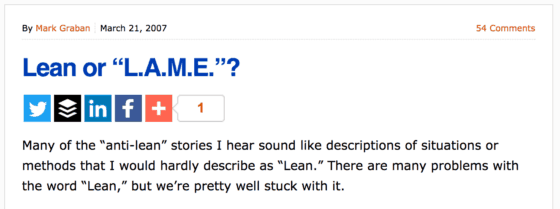The other day, I had reason to reference my initial post about “L.A.M.E.” and I realized that it's now exactly ten years old today…

I defined this awkwardly forced acronym to mean two things:
- Lean As Mistakenly Explained
- Lean As Misguidedly Executed
Or any combination of those words.
Back then in 2007, I wrote that many of the times when employees are complaining about “Lean,” they are actually (and rightfully) complaining about something that's not really Lean at all. This still happens today.
Hear Mark read this post — subscribe to Lean Blog Audio
This has spurned many blog posts over the decade… and this problem hasn't gone away, with my un-clever acronym or otherwise.
You can see some past posts on this theme (and everything tagged as LAME from this blog):
The theme of L.A.M.E. also led to the creation of this video (which has been viewed more times than any content I've ever created… which is sort of sad):
My reflections on labeling things as “L.A.M.E.” also led to the Practicing Lean book that I hope is a more constructive contribution to the Lean community.
There's a difference between these two situations:
- Somebody making an honest mistake with Lean practices because they are new to this (be patient, coach them, and try to help them understand)
- Somebody running around repeatedly saying the wrong things (and never learning)
Situation #2 should be more readily criticized… as I've done and will continue to do. I hope it's helpful.
As I wrote about in Practicing Lean, I've questioned whether it's nice or helpful to point out “L.A.M.E.” and to label it as such:
While it might be technically correct to label something as L.A.M.E. or “Fake Lean,” is it kind or nice to do so? Upon reflection, it probably is not. Is it necessary to speak out? Maybe. Is it respectful to call out bad practices? I'd argue it is, if we're trying to help those who are being harmed or jeopardized by L.A.M.E.
Instead of just criticizing, is it better to take the patient tone of a coach or mentor? I like to think I'm a constructive mentor with people in person. I've never called a person or an idea stupid. But, I may have failed by shooting somebody a glance that might have suggested as such. We all have room for improvement.
By calling a scenario L.A.M.E., are we making the person involved in the story defensive, thereby possibly stifling their growth and development if they just retrench? What if the person who determined that employees shouldn't put sweaters on their chairs because it looks bad is a conscientious — but inexperienced — Lean facilitator who is trying hard to learn and practice Lean? How patient should we be?
There are times I have probably been too harsh in my online writing. It's easy to sit behind a keyboard and criticize. Maybe I should be more patient. Then again, maybe some of the people behind these L.A.M.E. practices are choosing to be willfully ignorant about Lean principles. Does the criticism get through to them, or am I just preaching to the converted?
Here is a post about how one of my “L.A.M.E.” rants actually helped an organization avoid some mistakes that could have really alienated their employees… I did get a thankful email from the person who helped avoid a bad situation by learning from somebody else's “mistake.”
What do you think about this? Why do we still see or experience L.A.M.E.? Is this problem at all likely to go away? Or is it a natural part of the learning process that people have to go through?
Is it helpful to label things as L.A.M.E.? Can it be respectful, or no?
What do you think? Please scroll down (or click) to post a comment. Or please share the post with your thoughts on LinkedIn – and follow me or connect with me there.
Did you like this post? Make sure you don't miss a post or podcast — Subscribe to get notified about posts via email daily or weekly.
Check out my latest book, The Mistakes That Make Us: Cultivating a Culture of Learning and Innovation:






![Responding to a One-Sided Article That Trashes Lean in Healthcare [Updated]](https://www.leanblog.org/wp-content/uploads/2020/12/Lean-Blog-Cover-Image-3-238x178.jpg)



I still hope this dialogue continues, but here’s to hoping that there’s greater progress in 10 more years. I still routinely encounter experts & consultants who define lean as a narrow set of tools designed for flow or removal of waste from a linear/sequential process. There still appears to be a limited understanding of lean thinking defined as a set of leadership, management and operating principles.
Please keep up your efforts to shed light on this gap.